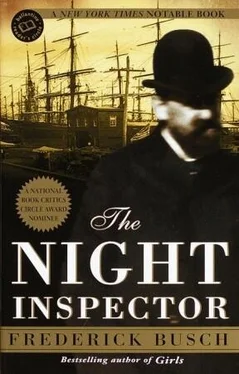I sighed and my breath went up the craters of my face.
Jessie said, in her dry, low, undramatic voice, “This is about Billy Bartholomew entering my life. Now you may take the mask off, Billy.”
“But I have,” I whispered.
“Not that one, dear,” she said, as if I would understand.
I made my way, on the arranged evening, to the foot of the Hudson River, at West Street, where, on a barge moored fast to the pier, some dozen feet, down wooden steps, below the level of the street, the Customs man on duty sat his watch of night or of day. The wagon traffic was diminished and, although not silent, or even quiet, the shipping district murmured rather than roared. Individual teams of horses, pulling heavy loads, could be descried, and one could even tell from which direction came the barking of a dog or the shouts of drunken men, the wailing of a child. The wind was up that night, and with it fog, and the moonlight thus was in retreat. I could tell the slapping of waves kicked up by the wind against the hulls of anchored ships. I could hear the little dip-and-splash of a boat with several rowers; perhaps it was the river police, I speculated, or perhaps a smuggler of courage and enterprise who took advantage of the darkness and the fog (it looked yellowish in the light of lanterns hung on stanchions on the dock and on the sterns of ships). One could turn a powerful profit if the night inspector turned his head at the right moment. It was chancy, of course, but a businessman must never close his eyes to chance.
M was in a broad armchair the horsehair stuffing of which protruded through the rents in its cushions. Still, he looked comfortable. A lantern on a gimbal in the center of the room gave mellow light that swayed as the barge was moved by the water responding to gusts of air and wakes upon the river left by passing craft. An unopened book lay on his lap — something called The Will as World and Idea , he told me, by a fellow called Schopenhauer, whom I’d never read. (“The man’s a scowling pessimist,” he fondly said when I asked what his attractions were.) The room was hung with what seemed to be charts and schedules of duty. Closely printed forms lay in stacks on rows of shelves. Several sets of locks, their hasps unfastened, lay atop the forms perhaps as paperweights. A small table with a box of pencils and a ruled notebook showed me where he worked. I thought of the sailor to Polynesia, the librarian of whales, inscribing poems no one might read in a government-issued notebook with the pencils given him for writing down the provenance of foodstuffs, the ownership of hides in stinking piles in the cargo holds of ships.
“Welcome, shipmate,” he said, standing with a youthful flexuousness. I remarked to myself once more that he affected clothing — black suit, a collar none too clean, a shirt of equal smudginess — of unusual looseness. His boots seemed cracked and cheap. He squinted, as he usually did, and he rubbed at his shoulder.
“A bit of neuralgia from the dampness of the river,” I suggested.
“Oh,” he said, “you get the twinges near water. An old fracture from a wagon accident. In Pittsfield, I was known to let the horses have their head, and mine as well. I learned my lesson over all the months it took me to heal. I’m good as new, of course.”
“Except for the twinges,” I said. He indicated the easy chair, but I took the captain’s chair at his desk, and then he sat, too.
“You know about them, then.” He gestured at my mask.
“I can feel iron needles slide in, some nights, in the midst of one of my marathon walks. There — I have to confess it, I continue to resent the pain’s continuation — there are days when my face bones ring like wagon wheels on paving stones. Sometimes I think I’ve just been wounded again, and I’m waking to find myself in the ambulance wagon way down South, or coming to in Washington and screaming for someone to kill me.”
“You did that,” he said, with something of wonder, stroking his beard, narrowing his eyes. “Asked for death?”
“It seemed the only comfort I might find. I’m not proud of howling. But I howled.”
“Yes,” he said, “we do that. Did Job not howl?”
“And you?”
“Oh. No. I was proud, and I was among neighbors, for my household has always been too full. I wished them strangers so that I might have, I can promise you that. But no.”
“No. And now?”
“And why now would I declaim upon the very narrow and not particularly gripping story of the self you’ve so generously come to see?”
“Well, sir, you’re the one, instants ago, who mentioned Job. Unless you think his story pertains only to me.”
“To the nation. To the martyred President. To you, Bill Bartholomew, for certain, and your comrades in battle.”
“And to you?” I asked him. “Are you not one of us?”
He shook his head. He smiled without conviction. “My travails are not those of Job, but rather of a family man with too much family and too few funds to pay for family. And of a literary man without the literature. One mustn’t complain, though.”
“Not so’s they can hear one,” I said. He opened his mouth, like a cat yawning, to soundlessly laugh, or make the motions of laughter. It seemed to me, as I looked into the darkness of his mouth, that he dissembled, and that the man I saw and who saw me perhaps was not the man I thought to see. I wondered who, in fact, was seated before me, but I did not speculate aloud as we sat companionably, two strangers apparently at ease with one another and with the office that slowly rocked at the pier. Everything shifts, I thought. “No,” I said, as if we had been reading one another’s thoughts, “it is that you rose to such a pinnacle height.”
“You have read my Whale . You have seen the masts go under, Tashtego’s arm wielding the hammer to affix Ahab’s flag as the masthead disappears beneath the sea. That is the natural course of events for pinnacles and heights, Bill. They plummet. I have plummeted. You know my Confidence-Man? It was published a decade ago, on April Fool’s Day. At the end, a light not unlike this one”—he gestured at the ceiling fixture—“is extinguished. All the light by which I apprehended my subject was extinguished. April Fool. Something further may come of this masquerade.”
“Pardon?” I did not know the book to which he referred, yet I did not wish to further insult his wounded pride.
“That was the final line of my book.”
“Yes,” I said, “of course.”
“Something further. I’d no idea what. I stopped the book because my vitality or my kidney failed. It was about devilish business, and I had thought to navigate further in the matter. But I stopped. One fellow, an English journalist, called it an abortion. I had to ask a literary Dutchman of my acquaintance what the word meant. Are you familiar with it?”
“Certain ladies of my acquaintance are familiar with it.”
He nodded. “The flesh makes clarion signals we cannot ignore.”
“I have heard the word employed.”
“In evaluating books?”
“No, sir. In describing a surgery.”
“Exactly. It was used in connection with my book.”
I said, “Such a sordid profession! To earn one’s bread by commenting cruelly on a man’s labors. Still, the judgment’s a commodity.”
“And life’s a market, yes? I see the downtown stockyards, and the bellowing, dazed creatures, and the stench, the rising dust behind which the men, bloody from the abattoir, are hidden as the cattle prance in their panic. It’s a gloomy, Satanic sight! I see the hammer descend, crushing their skulls, and I see the blood and brains leaking while, before they are dead, the cattle are flayed and filleted. They die as they are hung to bleed in choicest cuts. So with authors. For sale! For sale!” He was up, and lithe as a boy, marching toward a cupboard with a small keyhole. “For sale! Prime butchery! Beef on the hoof! Volumes fresh killed!” His soft voice rose, and then he pantomimed, turning to face me, his soundless laugh. He raised a ship’s decanter, with its heavy base, and, a finger inside each one, lifted with his other hand a couple of etched blue glasses. “Let’s drink to the market. To the meat yard. To the meat.”
Читать дальше












